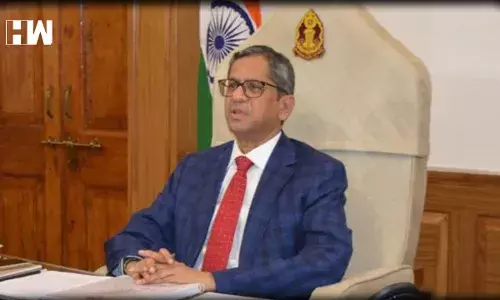New Delhi: Chief Justice of India NV Ramana on Saturday said that provisions for stronger enforcement and action against infringement are the need of the hour and with start-ups coming up in a big way across the country IPR (intellectual property rights) field of law has become more relevant than ever before.
“Provisions for stronger enforcement and action against infringement are the need of the hour. Awareness campaigns, especially in rural areas, are required to be undertaken. There have been a few success stories like Darjeeling tea and Chanderi silk. These success stories need to be studied and replicated in other GIs (Geographical Indications) as well. With the start-ups coming up in a big way across the country driven by innovative youth, this field of law has become more relevant than ever before,” the CJI said at the National Seminar on the adjudication of IPR disputes in India in New Delhi.
The CJI said whenever entrepreneurs and hosts around the world ask him as to how investor-friendly the Indian judicial system is, his answer has always remained the same; that the “Indian judiciary is absolutely independent and it always treats all the parties equally and equitably”.
The CJI also said that with the advent of economic liberalization, the country’s IPR regime has undergone a rapid transformation.
“This transformation was driven by the compulsions of integrating our economy with that of the world. With the advancement of technology, we are witnessing more complex issues in litigation, be it in IPR, IT and other fields. The complexities involved demand assistance from experts and specialists in the adjudication process,” he added.
The Intellectual Property Division of the Delhi High Court and its functioning would hopefully serve as a model which could be replicated, the CJI further said in the event organized by the Delhi High Court.
He pointed out that the Supreme Court has played a crucial role in the IPR field and in a judgment it helped the common man by ensuring that the price of life-saving drugs remains affordable.
“Today, India’s position as the Pharma hub of the globe is largely attributable to the existing IPR regime,” he said.
He also said that intellectual property is a field of law that protects creativity and innovation and its importance has also been felt during the ongoing pandemic.
“Innovation, and that too quick innovation, has become the order of the day. With the onset of the pandemic, vaccines and medications had to be researched, trials had to be conducted and commercial-scale manufacturing had to take place within a span of few months. When the future generations will look back; the past two years of the pandemic will tell the story of human resilience and power of innovation,” the CJI added.
He also pointed out that the vesting back of IPR jurisdiction in High Courts from IPABs (Intellectual Property Appellate Board) has come at a time when the system is overburdened with backlogs and stressed the need to improve judicial infrastructure.
“It is an appropriate moment to build sufficient capacities in our High Courts, so that intellectual property litigation can be conducted efficiently and smoothly. It is in this context that the seminar organized today is of significant value. These new and additional challenges can be effectively met by strengthening the High Courts. Not only do we need to fill the existing vacancies on an urgent basis, but there is also a need to increase the number of judges. With better service conditions we may be able to attract more and more talents into our fold,” said the CJI.
He also said the judicial infrastructure needs to be improved but unfortunately, not even the basic minimum standards are being met in this area.
“It has been my endeavour since assuming the office of Chief Justice of India, to put in place an institutional mechanism to coordinate and oversee the improvement of judicial infrastructure. Mere allocation of funds is not enough. The challenge is to put the available resources to optimum use. I have been pursuing the government for setting up statutory authorities, both at the centre and at the states. But unfortunately… It may be recalled that I have recently emphasized the need for continuous training and up-gradation of skills as one of the major challenges before the Indian judiciary,” CJI added.
The event was attended by CJI Ramana, Supreme Court judges, Chief Justice of Delhi High Court DN Patel, Justice Prathiba M Singh and other judges of Delhi High Court and other High Courts and Union Finance Minister Nirmala Sitharaman.
Union Finance Minister Sitharaman said that India is at the stage where the focus on growth and development has to be strengthened on all sides. When the government thought to encourage start-ups, it also thought to give them support through schemes and policy to bolster innovation, she added.
The question to give enough support to the protection of rights through laws was also one of the areas the government worked on and thus it then removed the IPAB and passed the load to the High Court.
In 2013-14 there were 4,000 patents that were filed and granted and now till this year it has increased to 28,000, Ms Sitharaman said, adding that this shows the confidence which the patent holders have in the system, trademarks application have increased to 2.5 lakhs.
As an independent media platform, we do not take advertisements from governments and corporate houses. It is you, our readers, who have supported us on our journey to do honest and unbiased journalism. Please contribute, so that we can continue to do the same in future.

